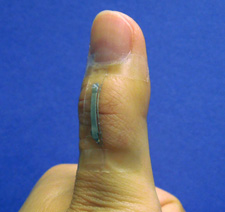 Researchers at North Carolina State University have developed wearable sensors, made up of silver nanowires, which can measure strain, pressure, human touch and bioelectronic signals.
Researchers at North Carolina State University have developed wearable sensors, made up of silver nanowires, which can measure strain, pressure, human touch and bioelectronic signals.
The technology was built on lead researcher Dr. Yong Zhu's earlier work to create elastic conductors from silver nanowires. To do this, researchers embedded insulating material between two stretchable conductors, which gave the conductors the ability to store electric charges. When the material was pushed, pulled or stretched, the capacitance, or ability to store an electrical charge, would change. The sensors worked when the data from these changes was sent to the researcher.
So far, some applications of the sensor include tracking movement of moving body parts such as the knee or the thumb.
"We have demonstrated the sensors for several wearable applications including monitoring thumb movement, sensing the strain of the knee joint in patellar reflex (knee-jerk) and other human motions such as walking, running and jumping from squatting," Zhu told MobiHealthNews in an email. "Very large strains were involved in those applications (up to 50 percent), much beyond the capability of traditional strain gauges. We have also demonstrated mapping pressure distribution and touch sensing."
During the experiment, Zhu said his team measured the data with a capacitance-to-digital device from semiconductor maker Analog Devices. While he said the devices should be able to connect to some other devices such as power sources, data storage or wireless transmission circuits, additional work must be done for the sensors to connect to the phone.
Eventually, Zhu wants to commercialize the sensors for biomedical applications, but he first wants to work on scalable manufacturing of the sensors and improving the device reliability.
Cambridge, Massachusetts-based MC10 has been making stretchable electronics since 2010. According to the company, these sensors can reach over 200 percent stretch, while preserving silicon performance. Earlier this month, MC10 raised $20 million and hired former Motorola executive Sanjay Gupta.














